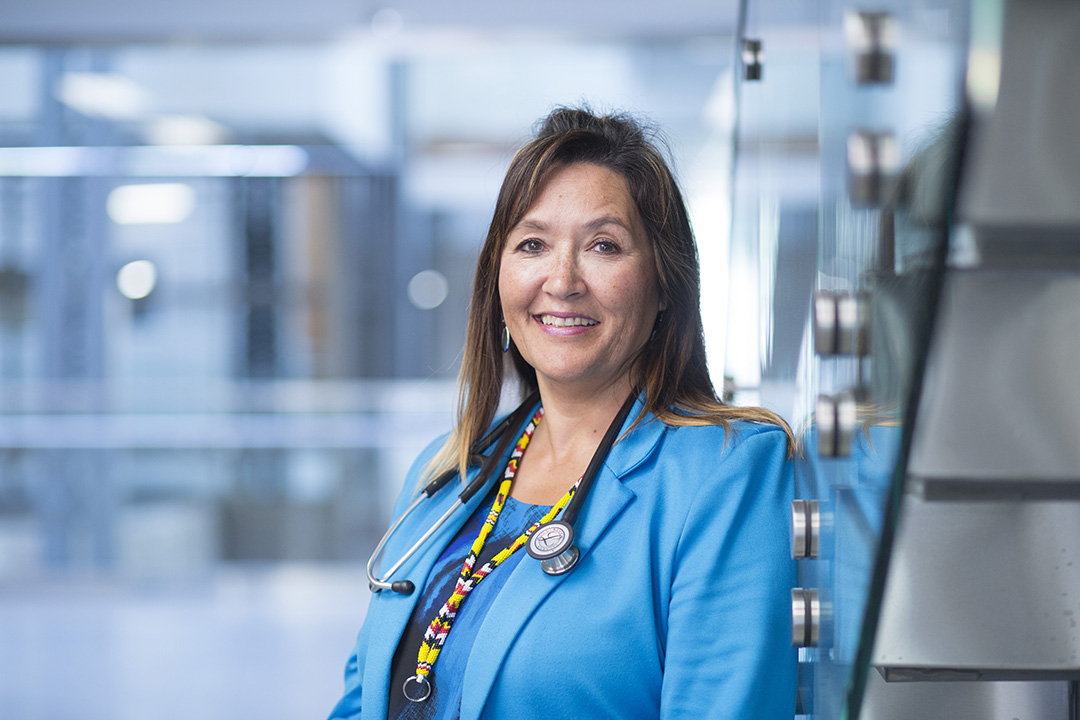
Communities that inspire
For Dr. Veronica McKinney, health is much more than just delivery of services.
By Chris MorinAs an Indigenous physician and director of U of S Northern Medical Services, McKinney aims not only to help shape the university’s College of Medicine, developing the curriculum that will aid new doctors in serving the province’s remote communities. She also hopes to inspire the youth of those same communities.
For McKinney, the concept of mentorship being an important part of fulfilling the vision of healthy communities came when she was doing her own northern residency—something that has stuck with her throughout her career.
“I remember that people would come just to see me, because they wanted to see what I looked like, if I really was an Indigenous person who was also a doctor. It was such an incredulous thing,” said McKinney, who graduated from the U of S College of Medicine in 1998. “And sometimes it still happens. But I knew it was important for these communities to see an Indigenous person serving as a doctor.”
Establishing community-based relationships is a key part of Northern Medical Services (NMS), which has been working to provide accessible health care in geographically and culturally distinct areas of Saskatchewan for more than 30 years.
While there are five main sites where the physicians of NMS are located, many of them will travel throughout the province in order to meet the health needs of many communities and to share information about what the university is doing. There’s also a student connection, said McKinney, so that these communities are not only able to get the knowledge of these physicians, but also to share their experiences with the students.
“Our doctors are involved with mentoring students in the university, but we try and reach the students in these communities before that,” she said. “A lot of studies have shown that if you can have a positive mentor it can encourage that youth to pursue more in these fields.
“As an Indigenous physician, we are still quite rare in this country and in this province,” she continued. “That’s why we will mentor any Indigenous youth who are interested in health sciences and we get into the schools and work with those educators to encourage this.”
While she works to empower those voices, McKinney is quick to point out that she is not trying to speak on behalf of these communities, rather, as an advocate. Working with northern strategy groups, NMS has helped to identify some key health areas that need to be addressed, with chronic diseases such as diabetes and heart disease being among the top problems.
Next on the list are mental health and addictions, said McKinney.
“For many of our Indigenous communities, trauma is a big part of what is currently happening. Adverse events and traumas experienced as children impacts a wide variety of areas and is the basis of issues that we are seeing such as depression and anxiety, and suicide.”
There is also a link between addictions and abuse, she said.
In light of the number of cases of HIV, there is also a growing need to address related health issues such as substandard housing. It’s McKinney’s hope that these programs that bring doctors to the north can also do more to protect children, and prevent health issues from affecting future generations.
“We have a very unique cultural group in our northern province,” said McKinney. “The population is younger and we have double the birth rate and it’s growing. But even when we had a boom in resource development, it didn’t necessarily translate into greater employment for people living in these areas, as people were brought in to work from other areas. There’s so many different dynamics that lead to a poor health scenario. We try and identify those, and we look for the people to bring in to help this situation.”
At the university level, McKinney is also involved in the ongoing indigenization efforts on campus in both curriculum development and research, in addition to recruitment and retention of Indigenous faculty at the U of S. She also aims to ensure that the admissions process is not a barrier to any potential applicants to the program—something that she sees as a point of success.
“I’m proud to say that the U of S has some of the highest numbers nationally of Indigenous medical students gaining entry into our college,” she said. “And we are getting more people from our northern communities who are graduating from our colleges, and it is so very encouraging.”
